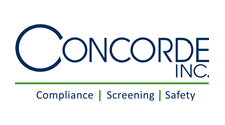Best Hiring Practices
Concorde counts down the Top 10 “Best Hiring Practices” for companies that do their own hiring and/or utilize agency services. These “Best Hiring Practices” are general guidelines supplied by Concorde’s General Counsel. For more information on how your company can implement these practices into your hiring process, please contact us today.
#10 Best Practice: Follow the Laws
Establish your Company’s policies, programs, practices and procedures for hiring in accordance with all Local, State and Federal laws.
#9 Best Practice: Standardize Documents
Develop employment applications, as well as all other forms for pre-hire, post-hire and post start, in accordance with all applicable laws. This includes Equal Employment Opportunity (EEO) and the Fair Credit Reporting Act (FCRA) in some cases.
#8 Best Practice: Consistency in the Interview Process
Develop and implement a standard interview process for all applicants. This may include company-wide standards and/or job positions standards in terms of the interview process. You should make sure that those conducting interviews are aware of all applicable laws in relation to the type of questions being asked of the applicant.
#7 Best Practice: Job Descriptions
Create detailed job descriptions and requirements for every position in the company; even if you are not hiring for that position at this time.
#6 Best Practice: Comprehensive Screening
Develop and implement the parameters and protocols for pre-employment screening for each job. This includes: pre-employment drug and alcohol testing, background screening, and physical examinations. All of the requirements and consequences for pre-employment screening results should be included in a company policy.
#5 Best Practice: Delegate Responsibilities
Outline roles and responsibilities for Company team members who will be participating in the hiring process.
#4 Best Practice: New Hire Training
Have in place a comprehensive orientation/training program for all new hires. This training should include, but certainly not limited to: corporate culture, customer service, job specific responsibilities, names and phone numbers of supervisors/managers, and introductions to staff members.
#3 Best Practice: Documentation
Document all of your hiring activities, policies, and procedures in an employee handbook. Every new hire should understand his/her responsibilities in the company during the hiring process, not after. Documentation is also important in regards to disciplinary action against employees who do not comply with company policies and procedures. If the rules are not written down, the rules do not exist.
#2 Best Practice: Communication
Talk to your managers, supervisors, and employees about the hiring process in a question and answer session format. This will help you to uncover valuable lessons learned to improve the hiring process. Unless you have a process in place to discover the problem areas in your hiring process, they will continue to exist and you will be left wondering why the process is not working properly.
#1 Best Practice: Choose Concorde!
Retain Concorde to assist your company in implementing all of the above “Best Practices.” Concorde has been in the Employee Screening, Compliance, and Health Services industry since 1983 and we pride ourselves on being able to share our knowledge with our clients. Whether you have a hiring system in place that needs to be updated or you are starting from scratch, Concorde has the expertise, service, and accessibility to help your company improve the hiring of your workforce.
